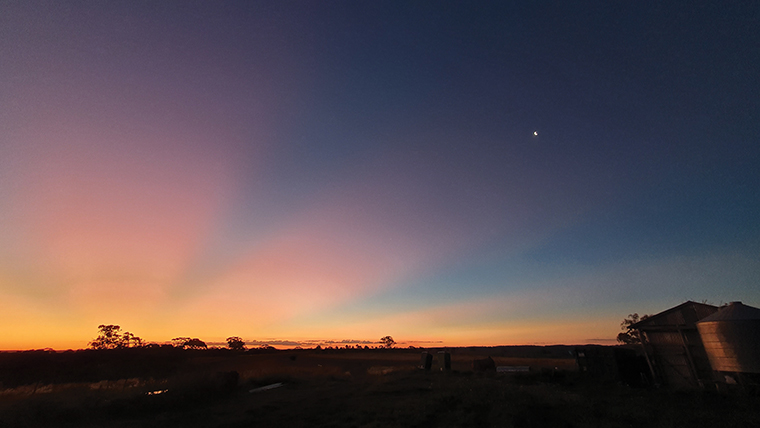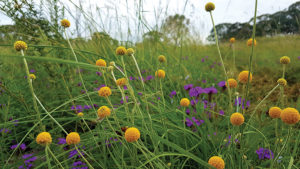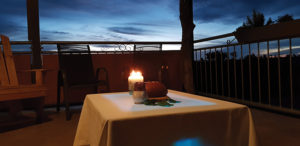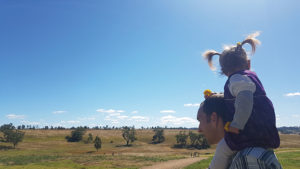By Bill Wiser

While some of the insights below may date this piece within the early weeks of COVID-19 lockdown, the historical context alludes to larger questions and to change as the essential ingredient to lasting regeneration and renewal. We have much to learn from those who sought for a new social order following the global crises of the two World Wars of the last century. May the immense challenges of today’s pandemic stir us toward a similar search and open us to new revelations. And may the death and suffering of millions today give us ears to hear and eyes to see the signs pointing to new possibilities of human flourishing as we continue to share life together on this precious planet.
Storms often sweep in without warning in the Northern Tablelands of New South Wales where my wife Grace and I live. A few days ago I found myself, bald head uncovered, standing wind-whipped and pummeled by a cold rain. In that moment I felt at one with the souls across the centuries who have likewise stood in storms—those who have known times of trouble and testing that come to us all, often descending out of nowhere. At the same time, I felt the raindrops’ promise, despite their sting, beating back the worst drought in living memory millimeter by precious millimeter. Hope rises out of despair. Storms bring destruction, but also regeneration.
A century ago, the tumult of World War I gave rise to the Bruderhof, the community to which I belong. Germany was in shambles. Millions were dead, millions more were unemployed. There was little food. In droves, the youth rebelled against authoritarianism and abandoned the institutions that had failed them, including the churches that had blessed the war.
And so it was that a small group gathered in post-war Berlin. They were nationalists, pacifists, atheists, communists, and Christians united in a common search for a guide to rebuilding amid the ruin. Despite their alienation from institutional Christianity, they found an answer in Jesus’ Sermon on the Mount. It was time for action and so, in June 1920, a few of them left the chaos of Berlin to start an intentional community in a small rural village. In a couple of rented attic rooms, the Bruderhof movement began.
As Germany headed toward a second world war, Bruderhof members dared to live a visible and public alternative to the madness of National Socialism—that is, until they were hounded from the land, eventually finding refuge in the United States.
It was there, in post-World War II America, that my parents and Grace’s first encountered and joined the Bruderhof. Their search started in different places: my dad had been a war objector; Grace’s father served as a sailor in the US Navy. Both married and started families after the war.
But it wasn’t the American Dream they were after. They, like those “enemy” Germans who founded the Bruderhof, were determined to find a blueprint to guide the building of a new social order. They banded with others to form intentional communities in Georgia (my parents) and North Carolina (hers). Eventually, this search brought both families to the newly-established Bruderhof in New York. There, Grace and I grew up, surrounded by the original German pioneers who were by then in their 60s and 70s.
Who would have predicted that 2020 would prove such a volatile year, so reminiscent of a century ago? At least this time around, it’s not a war of “us” and “them.” This time we are united in a fight against a common, invisible enemy—the coronavirus. But again, millions are out of work and tens of thousands are dying. Nations that once boasted of their GDP have been brought to their knees. The measure of a nation’s worth now is how well it cares—or does not care—for its weakest and most vulnerable citizens. Could this be another historic turning? Could it be that once again a cataclysmic event will open eyes to see and ears to hear?
Regardless, now it is our turn, and our children’s. This pandemic is our war, and our chance to rebuild. We are in the early stages, but perhaps even now, in a time of worldwide lockdown, lessons are emerging—both within intentional communities and in a wider context—that may serve as signposts for the future.

Lesson one: Change is good
Church looks different already, and it should! After all, Jesus didn’t found the model of church organization we’re used to today. Rather than asserting the right to carry on like before, as some pastors did initially, believers should embrace the call to change and take the lead in repentance, renewal, and rebuilding. Church has changed here at the Danthonia Bruderhof, too. With no communal gatherings, each member has had to take up the spiritual task of servant-leadership in his or her own household. I doubt children will forget watching their parents break bread and pass wine in our Easter celebration of the Lord’s Supper at home.
Although separate, no longer are we split denominationally, fighting our turf battles; we’re simply believers collectively at work in the neighborhood. One memorable Zoom conference with other local, Inverell-area pastors became the means to organize distribution of food hampers from a single, centralized base. Those delivering the food were instructed to say, if asked, that the hampers came from “the church of Inverell.”
Lesson two: The home front is part of the battle
Grace and I have been active for years in prison ministry and chaplaincy; yet now, we don’t leave the Danthonia property. But we find plenty to do, from singing a birthday song outside a window to saying a prayer (at appropriate distance) for an anxious soul. Or we pick up the phone to talk to a neighbor in town, or respond to a request that comes in on a chaplaincy hotline. Though our hearts remain at the frontlines, we’ve realized that an army is a single fighting unit: its effectiveness is directly related to every soldier sticking to his or her assigned role. We have discovered the blessing of doing the immediate task with joy, inventiveness, and humor. Every soul, whether the person next door, an inmate in the local prison, or a nursing home resident facing COVID-19 without family, has equal worth in the eyes of God.

Lesson three: Isolation is not separation
Surprisingly, confinement has served to connect us more robustly than ever with family, colleagues, and church members across the planet. Though I had never been a fan of technology because of its ability to make us “alone while together,” it has been invaluable for keeping us “together while apart.” Whether Zooming, making phone calls to elderly in the area, or emailing with children or church members thousands of miles away, I find immense fulfillment in making deep connections several times a day. Perhaps most meaningful to me is keeping in touch with health care professionals and chaplains serving in hospitals and hospices.
Lesson four: Learn to balance doing and being
We’ve not yet got this one right. Oddly enough, we still find ourselves exhausted at the close of each day—even more so than before. We’ve always been doers. Sure, we took time each day for prayer, reading, and contemplation in nature, but that was just to gain energy for all the doing. Now we find it is important to take a long walk together. I run regularly outdoors and find it the best time for prayer and reflection. And we love the quiet. It was never really “noisy” in our part of the world, but the stillness now is deeper and longer than it was before. It has been a season to “be still, and know that I am God” (Psalm 46:10).
Lesson five: Try to find humor in the friction
It took some time before I managed to find the humor in the irony that a lady who shares our house swears she will die—not of the coronavirus, but at the next whiff of my Indian cooking! Here I am, with more time than I’ve ever had to practice my favorite culinary pastime, and I cannot so much as reach for the cumin without setting off our housemate. Just wait: when this is over, Australia will not be large enough to contain the fragrant odors of my curry, biryani, and dahl.

Lesson six: The little things matter more now
Before the pandemic, I literally did not take time to stop and smell the roses that bloom outside our house. Nor did I linger as long as I do now when a rainbow or a particularly spectacular sunset graces our rural sky. One of our daily highlights is the visit of our one-year-old granddaughter with her parents. She does not understand why Nan and Pop don’t hug and kiss her anymore, but she gives us a big smile anyway, knowing that at her “Peas, peas” (please), Pop will pick two bright yellow marigolds and toss them to her. And we linger as we watch her depart, perched on her dad’s shoulder, a bright smudge of yellow in each hand.
Lesson seven: Have patience with yourself and others
Grace and I say sorry to each other more readily and more often than we did before. Maybe that’s because we see life so quickly and arbitrarily snuffed out across the world, and we want to make sure we end the day forgiven and forgiving. But, honestly, we’ve also had more need of both. It was really bad at the beginning, when I burst out in frustration at not being able to do my usual local chaplaincy work. Obviously, Grace could not fix this and shot back. Now we’re learning to be more patient with ourselves and with others.
It will take not just patience, but also peace of heart, to await the Spirit’s inspiration and guidance so that the blueprint is God’s and not ours. But even now we are joining others in prayer, that by God’s grace, we are ready for the rebuilding
Bill Wiser lives with his wife Grace at the Danthonia Bruderhof community in New South Wales, Australia, where they serve in a pastoral role and coordinate ecumenical activities with area churches and state-wide councils. Bill and Grace have deployed to fire grounds in Victoria as Rapid Response Team chaplains with the Billy Graham Evangelistic Association and are active in prison ministry through Prison Fellowship and Kairos Outside for Women. See Bill’s blog at www.bruderhof.com/en/voices-blog/following-jesus/combating-a-pandemic-of-loneliness.
Excerpted from the Fall 2020 edition of Communities (#188), “Scaling Up, Scaling Down” (available here or by subscribing).
